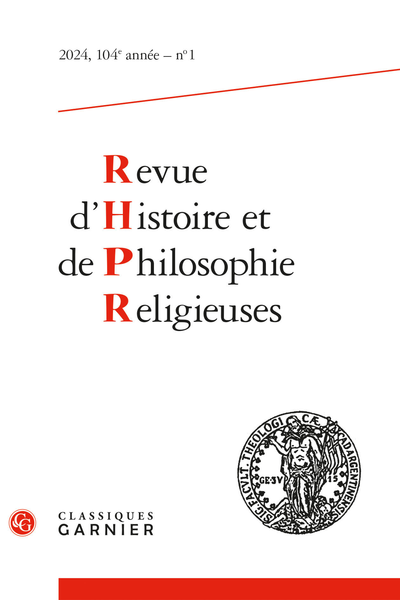
Abstracts
- Publication type: Journal article
- Journal: Revue d'Histoire et de Philosophie Religieuses
2024 – 1, 104e année, n° 1. varia - Pages: 117 to 119
- Journal: Journal of Religious History and Philosophy
- CLIL theme: 4046 -- RELIGION -- Christianisme -- Théologie
- EAN: 9782406166962
- ISBN: 978-2-406-16696-2
- ISSN: 2269-479X
- DOI: 10.48611/isbn.978-2-406-16696-2.p.0117
- Publisher: Classiques Garnier
- Online publication: 03-13-2024
- Periodicity: Quarterly
- Languages: French, English
Résumés/Abstracts
Aurélie Choné, « Un destin apocalyptique pour l’humanité ? Réponse à Job et écologie spirituelle »
L’analyse jungienne du livre de Job présente un certain nombre de structures apparentées à celles qui sont présentes dans les discours contemporains relevant de l’écologie spirituelle (culpabilité, angoisse, menace apocalyptique, sens de l’épreuve, possibilité d’une guérison). Elle éclaire ainsi la situation que nous vivons aujourd’hui et permet de comprendre en quoi le psychiatre suisse Carl Gustav Jung peut être considéré comme un précurseur du rapprochement entre écologie et spiritualité.
Mots-clés : Job, épreuve, Apocalypse, culpabilité, écoanxiété, Mal, Soi, christianisme, écologie, spiritualité.
Aurélie Choné, “An Apocalyptic Destiny for Mankind? A Jungian Response to Job and Spiritual Ecology”
The Jungian analysis of the Book of Job presents structures similar to those found in contemporary discourse on spiritual ecology (guilt, anguish, apocalyptic threat, sense of trial, possibility of healing). It sheds light on the situation we are living in today and helps us to understand how the Swiss psychiatrist Carl Gustav Jung can be seen as a precursor of the rapprochement between ecology and spirituality.
Keywords: Job, trial, Revelation, guilt, eco-anxiety, evil, self, Christianity, ecology, spirituality.
Frédéric Rognon, « Écologie et spiritualité. Les Communautés de l’Arche de Lanza del Vasto »
Les Communautés de l’Arche, initialement peu associées à des préoccupations environnementales, sont aujourd’hui un exemple emblématique d’articulation étroite entre écologie et spiritualité. C’est l’évolution de l’opinion publique qui les a menées vers de vigoureuses inflexions qui ont bénéficié de conditions de possibilité éminemment favorables déjà 118présentes dans la pensée philosophique du fondateur : l’exacerbation de l’idéal de « conversion » et la thématisation du concept de « compromis ».
Mots-clés : écologie, spiritualité, communauté, Lanza del Vasto, conversion, compromis, décroissance, hétérotélie, sérendipité.
Frédéric Rognon, “Ecology and spirituality. The L’Arche Communities of Lanza del Vasto”
The L ’ Arche Communities, which were initially rarely associated with environmental concerns, are today an emblematic example of the close link between ecology and spirituality. It is the evolution of public opinion that has led them towards energetic changes that have benefited from eminently favourable conditions of possibility already present in the founder ’ s philosophical thinking: the intensification of the ideal of “conversion” and the thematisation of the concept of “compromise”.
Keywords: ecology, spirituality, community, Lanza del Vasto, conversion, compromise, degrowth, heterothelism, serendipity.
Stéphane Lavignotte, « Historiciser et pluraliser l’articulation entre spiritualité et écologie : les théologèmes »
Depuis les textes de Lynn White et de Carl Amery à la jonction des années 1960 et 1970, la question de la responsabilité du christianisme dans la crise écologique est un débat classique dans la philosophie et la théologie de l’écologie. Pour dépasser le binarisme d’un judéo-christianisme coupable ou au contraire écologiste depuis sa naissance, ne faut-il pas historiciser et pluraliser les liens entre écologie et spiritualité ? À cette fin, le vieux concept de « théologème » est ici revisité.
Mots-clés : écologie, théologème, épistémè, Saint François d’Assise, Max Weber, Carl Schmitt, théologico-politique.
Stéphane Lavignotte, “Historicising and Pluralising the Link Between Spirituality and Ecology: Theologems”
Since the writings of Lynn White and Carl Amery in the 1960s and 1970s, the question of Christianity ’ s responsibility for the ecological crisis has been a classic debate in ecological philosophy and theology. In order to overcome the binarism of a Judeo-Christianity that has been guilty or, on the contrary, ecologically-minded since its birth, isn ’ t it necessary to historicise and pluralise the links between ecology and spirituality? To this end, the old concept of “theologem” is revisited here.
Keywords: Ecology, theologem, episteme, Francis of Assisi, Max Weber, Carl Schmitt, theological-politics.
119Jean-Sébastien Ingrand, « Actualité de la communion spirituelle entre Bernard Charbonneau et Jacques Ellul »
Unis par une pensée commune, Charbonneau, spiritualiste agnostique, et Ellul, protestant, sont reconnus comme des pionniers de l’écologie politique. Décrypter leurs œuvres sous l’angle de la communion spirituelle qui les a unis permet de souligner le message actuel qu’ils nous laissent. À l’heure du désespoir, du nihilisme et du déni climatique, retrouver ces dimensions peut inspirer les luttes que certains mènent pour le vivant et rendre possible leurs actions communes malgré leurs différences.
Mots-clés : Bernard Charbonneau, Jacques Ellul, communion spirituelle, éco-spiritualité, écologie politique.
Jean-Sébastien Ingrand, “The Relevance of the Spiritual Communion Between Bernard Charbonneau and Jacques Ellul”
United by a common framework of thought, Charbonneau, an agnostic spiritualist, and Ellul, a Protestant, are recognized as pioneers of political ecology. Deciphering their works from the perspective of the spiritual communion that united them, we can highlight the current message they leave us today. At a time of despair, nihilism and climate denial, rediscovering these dimensions can inspire the struggles that some people are waging for life and make possible their common actions despite their differences.
Keywords: Bernard Charbonneau, Jacques Ellul, spiritual communion, ecospirituality, political ecology.